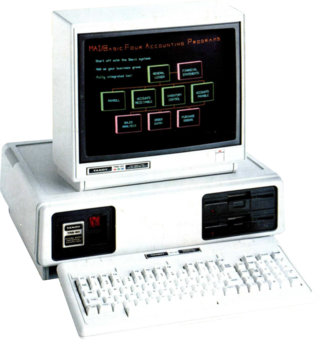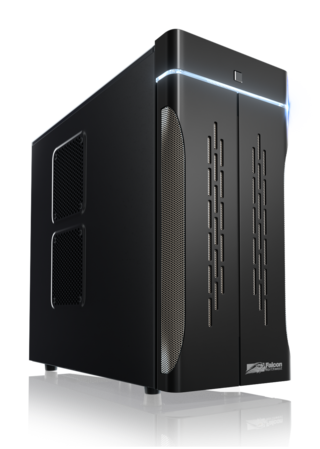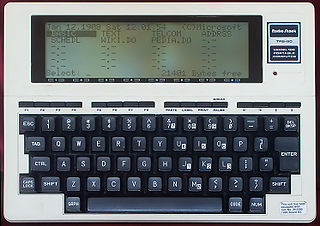Related Research Articles
Tandy Corporation was an American family-owned leather-goods company based in Fort Worth, Texas, United States. Tandy Leather was founded in 1919 as a leather supply store. By the end of the 1950s, under the tutelage of then-CEO Charles Tandy, the company expanded into the hobby market, making leather moccasins and coin purses, making huge sales among Scouts, leading to a fast growth in sales.

In the computer industry, vaporware is a product, typically computer hardware or software, that is announced to the general public but is late or never actually manufactured nor officially cancelled. Use of the word has broadened to include products such as automobiles.

Xenix is a discontinued version of the Unix operating system for various microcomputer platforms, licensed by Microsoft from AT&T Corporation in the late 1970s. The Santa Cruz Operation (SCO) later acquired exclusive rights to the software, and eventually replaced it with SCO UNIX.

Digital Research, Inc. was a privately held American software company created by Gary Kildall to market and develop his CP/M operating system and related 8-bit, 16-bit and 32-bit systems like MP/M, Concurrent DOS, FlexOS, Multiuser DOS, DOS Plus, DR DOS and GEM. It was the first large software company in the microcomputer world. Digital Research was originally based in Pacific Grove, California, later in Monterey, California.

The Tandy 2000 is a personal computer introduced by Radio Shack in September 1983 based on the 8 MHz Intel 80186 microprocessor running MS-DOS. By comparison, the IBM PC XT used the older 4.77 MHz Intel 8088 processor, and the IBM PC/AT would later use the newer 6 MHz Intel 80286. Due to the 16-bit-wide data bus and more efficient instruction decoding of the 80186, the Tandy 2000 ran significantly faster than other PC compatibles, and slightly faster than the PC AT. The Tandy 2000 was the company's first computer built around an Intel x86 series microprocessor; previous models used the Zilog Z80 and Motorola 6809 CPUs.

International Data Group is a market intelligence and demand generation company focused on the technology industry. IDG, Inc.’s mission is centered around supporting the technology industry through research, data, marketing technology, and insights that help create and sustain relationships between businesses.

In personal computing, a tower is a form factor of desktop computer case whose height is much greater than its width, thus having the appearance of an upstanding tower block, as opposed to a traditional "pizza box" computer case whose width is greater than its height and appears lying flat.

The TRS-80 Model 100 is a portable computer introduced in April 1983. It is one of the first notebook-style computers, featuring a keyboard and liquid crystal display, in a battery-powered package roughly the size and shape of a notepad or large book.
Net-Works II is a bulletin board system software package written by Nick Naimo for the Apple II family of microcomputers and originally published in the early 1980s. For a time it was the most popular bulletin board system software for the Apple II, out of the dozen or so released for the platform in the 1980s.

80 Micro was a computer magazine, published between 1980 and 1988, that featured program listings, products and reviews for the TRS-80.

Following the introduction of the IBM Personal Computer, or IBM PC, many other personal computer architectures became extinct within just a few years. It led to a wave of IBM PC compatible systems being released.

The TRS-80 Model II is a computer system launched by Tandy in October 1979, and targeted at the small-business market. It is not an upgrade of the original TRS-80 Model I, but a new system.

The TRS-80 Model 4 is the last Z80-based home computer family by Radio Shack, sold from April 1983 through late 1991.
Smoke Signal Broadcasting, Inc. (SSB), later known as Smoke Signal, was an American computer company founded in 1976 by Frederic Jerome "Ric" Hammond of Hollywood, California. The company earned its reputation by offering expansions for the Southwest Technical Products (SWTPC) 6800 microcomputer. It later manufactured its own line of computers, called the Chieftain. Though it remains little-known, Smoke Signal was an early and important manufacturer of multi-user computer systems.

Magic Desk was a planned series of productivity software by Commodore Business Machines for the Commodore 64. Only the first entry, Type and File, was ever released. It was introduced at the summer edition of the 1983 Consumer Electronics Show in June, slated for an August 31 release. Commodore developed the Magic Desk suite both in response to a perceived lack of productivity software for the Commodore 64 and to the graphical user interface of the Apple Lisa.
Intelligent Systems Corporation (ISC) was an American technology company that sold portable computers, video terminals, expansion cards, and other peripherals through a variety of manufacturing subsidiaries. Founded in 1973, the company restructured as a master limited partnership in 1987, becoming Intelligent Systems Master Limited Partnership.
Parasitic Engineering, Inc., was an American computer company founded by Howard Fullmer and Gene Nardi in 1974. Named as a tongue-in-cheek reference to a comment by MITS co-founder Ed Roberts, Parasitic's first products were hardware upgrade kits to MITS' Altair 8800 microcomputer kit, improving the latter's power supply rating and susceptibility to noise. The company later released their own microcomputer based on the same bus as the Altair, the S-100, but it was less popular than the company's hardware-improvement kits. By 1979, the company had pivoted to providing upgrades to Tandy's TRS-80. Parasitic went defunct in 1983.
Quasar Data Products Inc. (QDP), later QDP Computer Systems Inc., was an American computer company based in 1979 in North Olmsted, Ohio, United States. The company was founded by Brian A. Catalucci and Dave L. Kelley, the former a trained engineer who had previously worked as an airline pilot.
References
- ↑ Wierzbicki, Barbara (1983-11-07). "Ovation integrates five applications". InfoWorld. CW Communications. 5 (45): 31–32 – via Google Books.
- ↑ "New Companies". Computerworld . 1983-10-24. p. 90. Retrieved 2015-03-17.
- ↑ Posner, Bruce G. (1983-09-01). "In Search of Better Business Plan". Inc. Mansueto Ventures. Archived from the original on 2010-02-06.
- ↑ Shea, Tom (1984-05-07). "Developers Unveil 'Vaporware'". InfoWorld. Vol. 6, no. 19. pp. 48–51 – via Google Books.
- 1 2 Bartimo, Jim (1984-12-03). "Stoking the Micro Fire". InfoWorld . p. 48. Retrieved 2015-03-17.
- ↑ Needle, David (1984-02-20). "Late Breaking News". InfoWorld. p. 11. Retrieved 2015-03-17.
- ↑ Alsop, Stewart II (1988-01-18). "Tandy DeskMate: Viva La Small Business" (PDF). P.C. Letter. 4 (2): 9–10.
- ↑ McCarthy, Michael (1984-11-12). "From the News Desk". InfoWorld. CW Communications. 6 (46): 13 – via Google Books.
- 1 2 Forbes ASAP Staff (2001-05-28). "Burning Questions, Final Answers". Forbes . Retrieved 2015-03-17.
- ↑ Flynn, Laurie (1995-04-24). "The Executive Computer". The New York Times: D4. Archived from the original on 2011-01-10.
- ↑ Townsend, Emru (2008-05-06). "The top 15 vaporware products of all time". PCWorld. IDG Communications. Archived from the original on June 19, 2021.